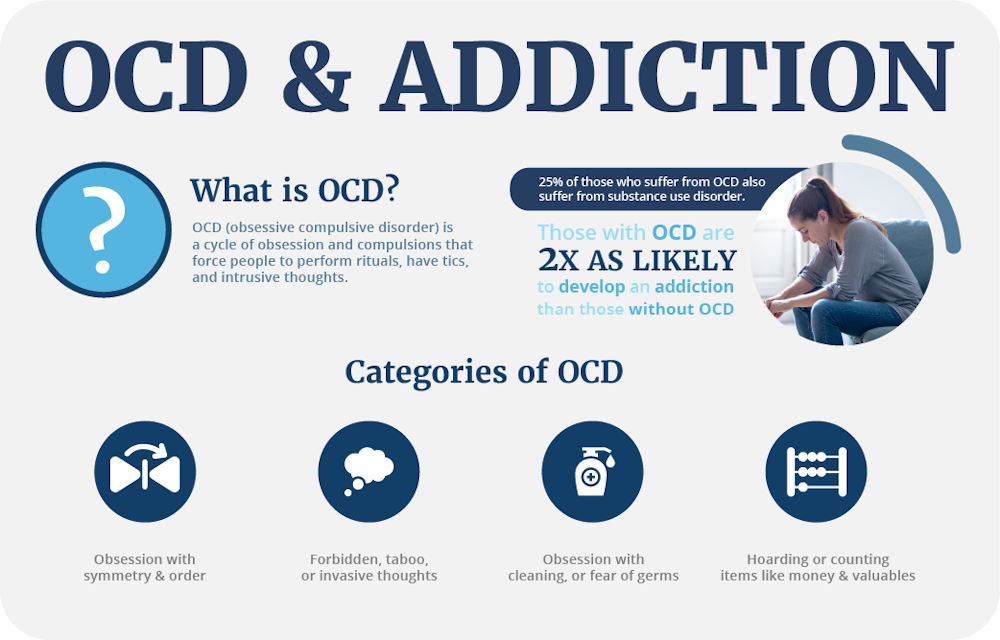OCD and Addiction
Many individuals have co-occurring disorders such as OCD and addiction. But, there seems to be a misunderstanding concerning these disorders. Contrary to popular belief, OCD (or obsessive-compulsive disorder) does not have to do with simply being neat or clean. This condition involves more than that, it includes compulsive behavior and other internal elements.
This notion, that OCD is just hyperactive cleanliness, does harm to those suffering and struggling with OCD. Yes, obsessive-compulsive disorder can sometimes appear through obsessions or rituals with cleaning, compartmentalizing, etc. This is otherwise known as dual-diagnosis or co-occurring conditions.
When it comes to mental health and substance abuse, addiction treatment centers like Discovery Institute offer comprehensive help for both conditions to properly understand OCD and substance abuse, as well as treat both illnesses, we must be educated on each subject.
It is recommended to seek treatment for drug or other drug and alcohol dependence, addiction, and mental health disorders such as OCD. Once we have developed a basic understanding, we will look at three ways in which we can take steps toward recovery.

What is Obsessive-Compulsive Disorder (OCD)?
Obsessive-compulsive disorder is a common mental illness in which a person may have uncontrollable, recurring thoughts (obsessions) and compulsive behavior (compulsions) which they feel the need to perform over and over. This can include flipping the light switch on and off repeatedly every time they enter a room. Or, perhaps, it can be having to polish every door knob they open. OCD symptoms vary and may include numerous possibilities of what these obsessions or compulsions can manifest into. However, as we can see, it is much more complex than simply “hyper-cleanliness.”
Since we have discussed what OCD is not, to understand the connection between OCD and addiction, we must understand what it is. These obsessions are repeated thoughts, repetitive behaviors, urges, or mental images that cause anxiety. They can include common symptoms such as aggressive thoughts towards others or self, unwanted thoughts or taboos sexually, religiously, or harmfully, or needing to have objects symmetrical/in order. Negative consequences can arise from these compulsive behaviors. Mixing mental illnesses, an anxiety disorder, and abusing drugs can be a problem as well.
A person suffering from OCD does not get a sense of pleasure from these tasks. But there may be a brief, temporary relief from emotional pain and the anxiety caused by obsessive thinking. Most people who suffer from OCD are diagnosed by 18 and roughly 1.8% of adults were diagnosed in the past year. There is also an estimated total of 2.2 million people living with this disorder. OCD symptoms tend to vary from case to case.
Is Addiction a Disease?
While many argue that drug addiction is a choice, just like any other, what science tells us is that addiction (or substance use disorder) is a disease. Recently the surgeon general has declared addiction to be a disease, which sparked much debate. The problem surrounding the idea that addiction is a choice stems from ignorance of science and the benefits of the disease model.
See, the way our brains are wired is to want more things that make us feel good. Due to evolution, we are wired to want the tastiest fruit or the yummiest berries. These were usually the most healthy. However, when we use substances such as narcotics or alcohol, our whole brain structure starts to change. The substances rewire the memory, pleasure, and motivation centers in our brain so we no longer feel normal without the substance. This is called dependency. “Choosing” is never black and white when it comes to substance addiction.
What Is A Co-Occurring Disorder?
A co-occurring disorder, or a dual diagnosis, is when two diseases occur simultaneously, such as OCD and addiction. When a person has a co-occurring disorder, it is not just two different illnesses in one body. Instead, they intertwine and strengthen one another. This makes it even more difficult to cope, and more difficult to treat both illnesses. This is why it is so important to treat the whole person. Holistic care is an incredible way to combat co-occurring disorders like OCD and addiction.
All too commonly, co-occurring disorders are seen in the context of mental illness and addiction. Not only do these two illnesses intertwine, but they can also depend on one another, This not only affects how we cope (self-diagnosing), it affects how we recover. No longer is it possible to simply treat other disorders as one disease. Many now argue that proper treatment must act as though the co-occurring disorders are one disease, and tackle both together (rather than separate).
Now that we have covered co-occurring disorders, we can address the connection between OCD and addiction. We at the Discovery Institute believe dual diagnosis must be treated together, and want you to know that we are here for you with the most medically backed treatment there is.
The Connection Between OCD and Addiction
 Unfortunately, there is a close tie between those who struggle with obsessive-compulsive disorder and addiction. Of those who have obsessive-compulsive disorder, roughly twenty-five percent also struggle with addiction. Thus, forming a co-occurring disorder.
Unfortunately, there is a close tie between those who struggle with obsessive-compulsive disorder and addiction. Of those who have obsessive-compulsive disorder, roughly twenty-five percent also struggle with addiction. Thus, forming a co-occurring disorder.
Symptoms of OCD can often be debilitating for many individuals. Individuals who struggle with severe symptoms of this disorder constantly have anxious thoughts and compulsions. In an attempt to escape these intrusive thoughts, it is easy to want to nullify the brain.
Professionals are not certain whether, in a dual diagnosis case, addiction causes mental illness or vice versa. But self-medicating, isolation, and other anxiety disorders are all triggers of addiction. The connection between obsessive-compulsive disorder and addiction is clear. Substances are a quick relief to those suffering from OCD. Yet again, the choices we make are not so black and white.
Alongside this, secrecy and isolation are hallmarks of OCD. Many of those who struggle with this disorder feel as though they cannot be around people due to their thoughts and compulsions. However, this is yet another trigger of addiction.
CONTACT US
Find out how we can help
Our compassionate counselors are standing by to answer any questions you may have. After helping thousands of people over the last 50 years, we have the resources to help you and your family and all your individual needs.
How Do I Know If I Have OCD and Addiction?
As we discussed previously, a few signs of this particular dual diagnosis include:
- Isolation
- Severe withdrawal symptoms
- Exasperated OCD symptoms
- Even more enhanced feelings of paranoia and anxiety
If you believe a loved one is struggling, consider an intervention. Interventions are a great way for loved ones to motivate us to recover. However, they can be complex. That is why the Discovery Institute has an intervention guide available to you. If your loved one exhibits the above signs, perhaps it is time to step in and help.
Treating OCD and Addiction
 A comprehensive approach is usually taken when treating OCD and Addiction, which encompasses medication, therapy, and adjustments to one’s lifestyle. Cognitive behavioral therapy (CBT) is the most commonly used approach to treat OCD, aiming to help clients identify and replace irrational thoughts with more functional ones. This therapy also assists in developing behaviors that align with reality and are more functional. Moreover, evidence-based therapies and practices have proven effective in treating individuals with OCD and co-occurring substance use disorders. When it comes to substance abuse treatment for individuals with OCD, it is crucial to initiate it alongside the therapeutic modalities they are already receiving.
A comprehensive approach is usually taken when treating OCD and Addiction, which encompasses medication, therapy, and adjustments to one’s lifestyle. Cognitive behavioral therapy (CBT) is the most commonly used approach to treat OCD, aiming to help clients identify and replace irrational thoughts with more functional ones. This therapy also assists in developing behaviors that align with reality and are more functional. Moreover, evidence-based therapies and practices have proven effective in treating individuals with OCD and co-occurring substance use disorders. When it comes to substance abuse treatment for individuals with OCD, it is crucial to initiate it alongside the therapeutic modalities they are already receiving.
It is widely recognized that addressing both disorders simultaneously is essential for successful recovery and treatment progress. Therefore, individuals with OCD and substance use disorders should adhere to empirically validated treatment protocols for their substance use and anxiety disorders together. Treatment for other psychiatric disorders may include:
- Inpatient treatment is required for detox or for serious substance use issues that require the removal of the client from a potentially toxic environment.
- Medically assisted treatment (MAT) of withdrawal symptoms and other issues associated with substance use disorders.
- Longer-term outpatient treatment that includes individual and group therapy to address the issues that fueled the substance abuse and help the individual develop coping skills to prevent relapse in the future.
- Social support from family and/or in the form of 12-step group participation.
- Other important supports as needed, such as vocational counseling, placement services, etc.
- A long-term aftercare program to assist the individual through all phases of recovery and ensure that the individual has support down the road.
Medication management plays a crucial role in addressing various conditions. In the case of OCD, anti-anxiety medications are commonly prescribed to alleviate intrusive thoughts and compulsions. Furthermore, antipsychotic medications may be recommended to effectively handle co-occurring psychiatric symptoms. In the context of addiction, specific medications like benzodiazepines or buprenorphine can be utilized to minimize cravings and assist in managing withdrawal symptoms.
Behavioral therapies serve as the primary treatment for individuals struggling with OCD and addiction. These therapies aim to help individuals identify and change unhealthy patterns of thinking and behavior, enabling them to develop healthier coping strategies. Additionally, therapies like dialectical behavior therapy (DBT) and mindfulness-based approaches can also be beneficial in managing symptoms of OCD and addiction.
Apart from therapy and medication, lifestyle changes play a crucial role in the treatment of OCD and addiction. Maintaining a balanced diet, engaging in regular physical activity, avoiding triggers, and participating in meaningful activities are all essential aspects of recovery from these disorders. Furthermore, creating a supportive environment with the help of friends and other family members is vital. Establishing a strong support system can offer valuable emotional assistance during challenging times.
Dual diagnosis treatment is considered one of the most effective approaches for treating OCD and addiction. This form of treatment focuses on simultaneously treating both the substance use disorder and the underlying mental health condition. By addressing both issues together, individuals can develop healthy coping mechanisms and work towards achieving a life free from substance abuse.
Since OCD focuses on thoughts and compulsions, one of the best ways to treat it can be cognitive behavioral therapy. This therapy focuses on changing thoughts that affect actions. It sounds pretty similar to OCD, only almost reversed. In cognitive-behavioral therapy, you focus on your habits and coping mechanisms for harmful thought processes. But you learn how to rewire your brain to cope in healthy ways, as opposed to unhealthy ways.
This is an indispensable form of treatment for anyone dealing with obsessive-compulsive disorder and addiction. CBT is typically used during both mental health counseling and addiction treatment programs. One way in which people develop a dual diagnosis is through unhealthy coping mechanisms. So, a natural solution is to change cognitive processes and coping methods for the better.
Holistic therapy helps treat dual diagnoses since it focuses on treating the whole person. Mind, body, and soul are all involved in holistic care. Many who struggle with addiction are separated from the naturalness of life, such as mindfulness, nature, meditation, and focusing inward.
This is one of the reasons holistic rehab is so helpful. It is all about treating the whole person. The practice of fully embracing nature, truly looking inward, and practicing mindfulness (the idea of being completely aware of the moment) has been a proven form of treatment for those who struggle with addiction.
It is also a very helpful way for those of us with anxious thoughts to look past them, to our truer and deeper thoughts. Alongside this, dual diagnosis treatment works when treating both diseases as a whole. That is exactly what holistic care is all about.
There are various pharmacological interventions available to aid in the treatment of OCD; nevertheless, these interventions do not provide long-term solutions. While medications can complement therapy, they are generally not the most effective overall solution for treating OCD in the majority of cases. The primary objective of treatment should be to assist the individual in achieving maximum functionality and independence, and therapy plays a crucial role in helping individuals attain these goals.
The treatment of OCD is typically successful; however, similar to any psychological disorder, there may be some potential obstacles. Recovery can be a lengthy and occasionally challenging process. Additionally, there are instances where standard treatment does not yield positive results. For instance, a small subset of individuals may experience extremely severe OCD symptoms that are unresponsive to medication or therapy. In such cases, specific types of psychosurgery and deep brain stimulation may be beneficial in reducing obsessions and compulsions.
People who are in the recovery process should never feel alone. Those on the road to a new life should work together, offering support and accountability to one another. Developing those personal relationships with a community of loved ones who care about you and have gone through this journey with you helps tremendously.
Consider engaging in group therapy, Alcoholics Anonymous, Narcotics Anonymous, or going on outings with your recovery group. The more you can be open with others, engage in social bonding, and help build each other up, the better your recovery journey will be. Substance abuse treatment usually involves the help of support groups and the community.
We Can Help Treat Your OCD and Addiction Effectively
It is never too late to get help. We at the Discovery Institute are here for you at all hours of the day. Recovery seems daunting, but you owe it to yourself, your loved ones, and those in recovery to try. Drug and alcohol addiction, abuse, and mental disorders can all be treated with the right help. You deserve to take your life back. We have people available to connect with you, whenever you are ready. Contact us today to learn more.



